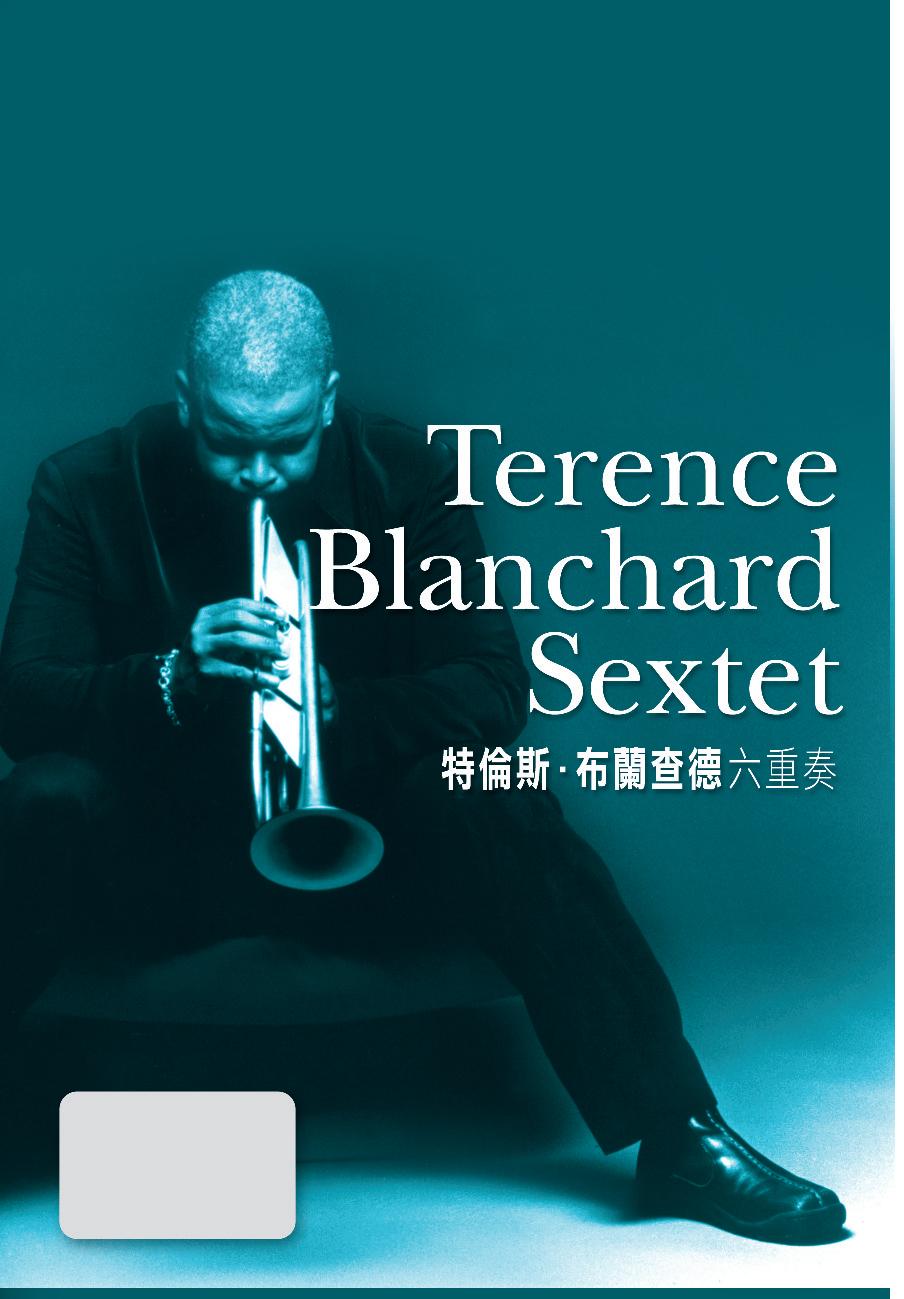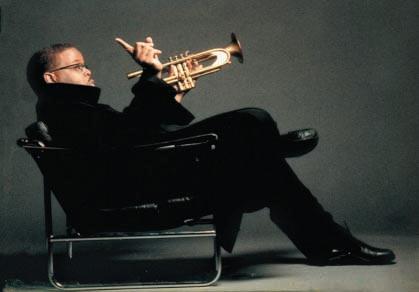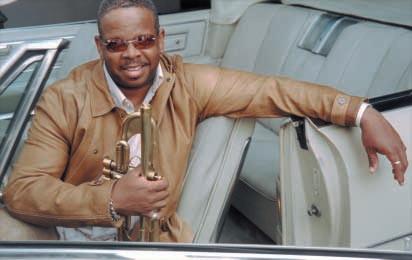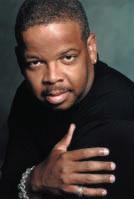Terence Blanchard: Staying Out There
by Charles Martin
You’re one of the last trumpeters to have a good long tenure as one of Art Blakey’s Jazz Messengers. What was that like?
It was an amazing experience. My band members get tired of hearing me talk about Art Blakey. He had such an impact on every aspect of my life, not only as a musician, but on the personal side as well. He was a brilliant man that a lot of people didn’t understand fully. He was a great fun-loving person, and a lot of people loved to hang around him, but he had a serious side as well. This was a guy who could quote the Koran in Arabic he was very religious. A lot of people didn’t see that side of him. He told me to always be on the case, to make sure I’m working on something all the time. If you have something to offer, the world will beat a path to your door.
Your band is on the young side. Are you playing the same role with them?
Not intentionally, but it’s starting to look like that. I guess it’s supposed to be that way. Art told me when I left the band, “I appreciate everything you’ve done for us, but you have to stay out there. It’s hard, but you have to keep this jazz thing moving.”
What are you working on lately?
I’m scoring Spike Lee’s next movie, called The Inside Man, starring Denzel Washington. And there’s one called Akeelah and the Bee, starring Lawrence Fishburne and Angela Bassett. Also a documentary called Finding Jackson Pollock. That’s been keeping me busy.
How do you balance a jazz player’s life with that of a film composer?
They feed off each other. The film thing has always helped me stretch my boundaries in terms of thinking, and also helped me consolidate my ideas, and make a show or album into one concise story. The jazz thing has informed the film thing, by helping me think on my feet rather quickly. I can score quickly, make changes quickly if I have to.
Your new album Flow is the first project that Herbie Hancock has produced for someone else in almost 20 years. Why did he do it?
I don’t know. You’ll have to ask him, but for us, it was a blessing for us. He’s a pioneer, a genius. I think part of it is we’ve been working at the Thelonious Monk Institute of Jazz for years. I’ve learned a great deal from him. I think he also appreciated the effort our band has made to develop our own sound.
How’s your tenure at the Thelonious Monk Institute of Jazz going?
I’m finding a lot of talented musicians with great styles. But the industry is struggling. They’re going to have to create an audience. Many generations of jazz musicians have had to do that. Part of that, I firmly believe, is in their being true to who they are. Jazz is not always an honoring of the history. Jazz has been the total opposite, blurring lines, obliterating traditions, forging new traditions against popular support. I think that’s something that’s been lost in the business. We’ve been so busy trying to bring the American public around to what’s going on, we’ve lost sight of how jazz musicians were the renegades of our artistic culture.
Do you think jazz artists have been too well-behaved recently, because they’re trying to be taken seriously?
We all want to be taken seriously, but no one’s talked about how jazz has been turned on its head. In the process of trying to gain respect, we’ve forgotten to forge ahead. I’ve always been interested in the stories of how Charlie Parker was run out of town, how people couldn’t stand what John Coltrane was doing at first, how musicians thought Ornette Coleman was crazy. But at the same time, those were our geniuses. Those were the ones who forged new territories in jazz, and in music as a whole.
The music public is starving for that. We need musicians that touch people’s souls, that bring them outside of themselves, that make them feel things that they don’t want to feel.
That’s hard to do when the business is focusing on research, on selling the most records to the most people.
That shouldn’t be an artist’s concern. An artist’s concern should be his art. It’s something that’s not being talked about in that way. We constantly talk in terms of numbers, talk about “is jazz dying,” that kind of stuff. That has nothing to do with art itself, except in terms of the lack of creativity that touches people’s souls. Herbie Hancock and Wayne Shorter are part of the Monk Institute for that reason, and I take my lead from them. The audience will stay and grow if the artists have something to say. It might not be what we want in terms of numbers, but look — how many people have been affected by John Coltrane over the years? Millions.
T特倫斯.布蘭查德
小號 Trumpet
特倫斯.布蘭查德 1962 年生於新奧爾良。他小學時開始吹小號,並在家 中接受唱歌劇的父親指導;中學時師從埃利斯.馬薩利斯,畢業後獲音 樂獎學金,入讀魯特杰大學。
布蘭查德在八十年代於紐約樂壇崛起,並迅速成為重振爵士 樂的「少獅」之一。 1983 年,在威恩頓.馬薩利斯推薦下, 布蘭查德接替馬薩利斯在阿特.布拉基的爵士信差樂隊中的 位置。布拉基的傳奇,包括他總能提高表演水平,以及培育 後進發揮即興潛質及創作理念。把仍在活躍演唱的樂隊當成 爵士樂培訓班,這種實踐是爵士樂的根本。今天仍然全面投 身於這種互動關係的樂手,可謂鳳毛麟角,而布蘭查德是其 中之一。兩年後,布蘭查德和爵士信差樂隊另一名成員唐納 德.哈里森離開樂隊,組建自己的五重奏樂隊。
1990 年,布蘭查德離開樂隊,發展獨奏事業。他大獲好評 的爵士樂唱片包括《彈回》和赫比.漢考克監製的《流動》,由 他配樂的電影超過三十部,當中尤以史派克.李的《爵士男 女》、《黑潮》和獲金球獎提名的《第 25 小時》等聞名。
Terence Blanchard was born in New Orleans in 1962. Picking up the trumpet in elementary school, he was also coached at home by his opera-singing father. In high school he came under the tutelage of Ellis Marsalis, and after graduation he attended Rutger’s University on a music scholarship.
Emerging on the New York scene in the 1980s Blanchard quickly became one of the ‘young lions’ in revitalising acoustic jazz. In 1983, Wynton Marsalis recommended Blanchard as his replacement in Art Blakey’s Jazz Messengers. Part of the Blakey legend was his ability to foster performances, and nurture improvisation and compositional ideas from the young talent in his fold. The legacy of the working band as a jazz workshop is at the essence of jazz, and Blanchard remains one of the few today who fully embrace that dynamic. After two years, Blanchard and fellow Jazz Messenger Donald Harrison left to form their own quintet.
In 1990, Blanchard departed to pursue a solo career. Along with his highly regarded jazz records, including Bounce and the Herbie Hancock produced Flow, he has scored over 30 films most famously for Spike Lee (Mo’ Better Blues, Malcolm X and the Golden Globe nominated 25th Hour among others).
© Pamela Springsteen
德里克.霍奇 Derrick Hodge 低音大提琴/低音電結他 Acoustic and Electric Bass
德里克.霍奇 1979 年生於費城,後與一家人遷居新澤西州的威靈 博羅。他七歲時開始學電結他,母親是比烏拉浸信會合唱團成 員,霍奇最初也受該合唱團低音結他手啟發。
高中時,霍奇是學校管弦樂隊、爵士樂隊和軍樂隊成員。 1996 年,他在貝克利音樂學院樂隊比賽中得獎,1996 和1997 年獲貝克 利音樂學院傑出獨奏獎。
霍奇於坦普爾大學埃斯特.博耶音樂學院修讀爵士樂作曲和表 演,還自學音響低音和低音電結他,並參與大學爵士樂隊小型合 奏團、大學交響樂團和新音樂室樂團的演出。
霍奇曾與不同音樂家和樂隊合作演出或錄音,包括特雷爾.斯坦 福德、唐納德.比爾德、布策.伯恩斯、基爾克.弗蘭克林、肯 尼.拉鐵摩爾、棉花棒、莫斯.德夫、蒂姆巴蘭德樂隊、吉爾. 斯科特、靈魂之童樂隊、傑拉德.萊弗特、卡尼.韋斯特、摩格 魯.米勒和克拉克.特里等。
Derrick Hodge was born in 1979 in Philadelphia, before the family moved to Willingboro, New Jersey. He began studying electric guitar at the age of seven, originally inspired by the bassist in the Beulah Baptist Church Choir, in which his mother sang.
In high school, he played in the school orchestra, the Jazz Band and Marching Band. In 1996 he won the Berklee College of Music High School Band Competition and the Berklee College of Music Outstanding Soloist Award in 1996 and 1997.
Hodge received a bachelor’s degree in Music from the Esther Boyer College of Music, Temple University, where he studied Jazz Composition and Performance. He studied the acoustic and electric bass privately, and was involved in the University Jazz Band and Small Ensemble, the University Symphony Orchestra and New Music Chamber Orchestra.
Derrick Hodge has performed and/or recorded with Terell Stafford, Donald Byrd, Bootsie Barnes, Kirk Franklin, Kenny Lattimore, Q-Tip, Mos Def, Timbaland, Jill Scott, Musiq Soulchild, Gerald Levert, Kanye West, Mulgrew Miller and Clark Terry, among others.
萊昂內爾.勞爾克 Lionel Loueke
結他/歌手 Guitar and Vocals
萊昂內爾.勞爾克生於非洲貝寧,先學敲擊樂器,十七歲時轉學 結他。 1990 年遷往象牙海岸,在國立藝術學院學習音樂,並對爵 土樂發生興趣,深受魏斯.蒙特哥馬利、喬.帕斯和喬治.本森 等藝術家的影響。 1999 年,他獲得波士頓貝克利音樂學院獎學 金, 2000 年畢業,取得爵士樂表演學位。
2001 年勞爾克被塞洛尼烏斯.蒙克音樂學院錄取為第一結他手, 獲漢考克、韋恩.蕭特和特倫斯.布蘭查德指導。
勞爾克曾與多位音樂家一同表演和錄音,包括吉姆.斯蒂內特、 傑夫.加林多、法蘭克.蒂貝里、鮑勃.赫斯特、阿方索.約翰 遜、安吉利克.基德約、赫比.漢考克、黛安娜.里夫斯、卡珊 德拉.威爾遜、韋恩.蕭特和查利.哈登等。
勞爾克最近兩年隨特倫斯.布蘭查德巡演,2005 年5月份隨赫比. 漢考克演出由昆士.瓊斯製作的「我們是未來」音樂會,該音樂會 在羅馬大競技場舉行,觀眾超過五十萬。最近,他亦參與特倫 斯.布蘭查德的最新唱片《彈回》的演奏及布蘭查德為史派克.李 的電影《沒有吸血鬼的城市》所作的配樂工作。
Born in Benin, Africa, Lionel Loueke first picked up percussion instruments before choosing guitar at the age of 17. In 1990, he moved to the Ivory Coast where he studied music at the National Institute of Art and his interest in jazz emerged, influenced by such artists as Wes Montgomery, Joe Pass, and George Benson. In 1999, he was awarded a scholarship to the Berklee College of Music in Boston, and graduated in 2000 with a degree in Jazz Performance. In 2001 Loueke was accepted as the first guitarist into the Thelonious Monk Institute, under the watchful eyes of Hancock, Wayne Shorter and Terence Blanchard.
Loueke has performed and recorded with Jim Stinnett, Jeff Galindo, Frank Tiberi, Bob Hurst, Alphonso Johnson, Angelique Kidjo, Herbie Hancock, Dianne Reeves, Cassandra Wilson, Wayne Shorter and Charlie Haden, among others.
Loueke has spent the last two year touring with Terence Blanchard and in May accompanied Herbie Hancock, in the Quincy Jones production, We Are the Future, held in the Circus Maximus in Rome for an audience of more than 500,000. Most recently he can be heard on Terence Blanchard’s latest recording, Bounce and on the Blanchard score of Spike Lee’s film Sucker Free City
阿倫.帕克斯
Aaron Parks
鋼琴 Piano
二十二歲的鋼琴家和作曲家阿倫.帕克斯於西雅圖成長,十歲開 始彈鋼琴,主要是憑聆聽而非樂譜來學習。很快,他就被即興音 樂所吸引。
十六歲時,在爵士樂鋼琴家喬安妮.布拉肯的鼓勵下,他轉往紐 約曼哈頓音樂學校,開始師從鋼琴大師肯尼.巴龍。僅一年餘 後,帕克斯即在第五屆美國爵士樂鋼琴比賽中奪得冠軍,並榮獲 美國鋼琴家協會 2001 年科爾.波特獎。十八歲生日剛過,便被邀 加盟特倫斯.布蘭查德的樂隊。
除了與特倫斯.布蘭查德一同表演和錄音外,帕克斯還曾與多位 音樂家合作,包括約翰.埃利斯、邁克.莫雷諾、埃立克.哈 蘭、米隆.瓦爾登、本.斯特里特、麗芝.賴特、拉奇.倫德、 羅德尼.格林、約翰.帕蒂圖奇、馬克.特納等。
帕克斯還有自己的樂隊,並已出版了四張唱片。
Twenty-two year old pianist and composer Aaron Parks was raised in Seattle. He began playing piano at the age of ten, learning mostly by ear, and was immediately attracted to improvised music. By age 16, with the encouragement of jazz pianist Joanne Brackeen, he moved to the Manhattan School of Music in New York and began to study with piano great Kenny Barron. A little over a year after moving to New York, Parks won first place in the 5th American Jazz Piano Competition and was named the 2001 Cole Porter Fellow of the American Pianists Association. Just after his 18th birthday, he was invited to join Terence Blanchard.
In addition to performing and recording with Terence Blanchard, Parks has also performed and/or recorded with John Ellis, Mike Moreno, Eric Harland, Myron Walden, Ben Street, Lizz Wright, Lage Lund, Rodney Green, John Patitucci and Mark Turner, among others. Aaron Parks also leads his own group, and has released four recordings as a leader.
肯德里克.斯科特 Kendrick Scott
鼓 Drums
鼓手肯德里克.斯科特常被形容為想像力豐富、生氣勃勃、多才 多藝。他 1980 年生於休斯敦,家中有多位音樂家,所以他從小就 接受音樂的薰陶。
他入讀表演與視覺藝術中學時,已加入管樂團、敲擊樂團和爵士 樂隊,提昇音樂才華。他受到埃立克.哈蘭、東尼.威廉斯、暱 稱「爸爸」的約.瓊斯、克里斯.達夫和馬克斯.羅奇等鼓手的影 響。他曾獲《強拍》雜誌頒予學生的獎項,以及國際爵士樂教育家 協會和全國藝術促進基金會頒發的克利福德.布朗/史丹.蓋茨 獎。
1998 年,斯科特獲獎學金入讀波士頓貝克利音樂學院,攻讀音樂 教育學。在校期間,他曾到全國各地和世界各地表演, 2003 年甫 畢業即加入十字軍樂隊和特倫斯.布蘭查德樂隊。斯科特曾與多 位音樂家合作,包括黛安娜.里夫斯、史蒂方.哈里斯、肯尼. 加雷特、帕特.梅特尼、加里.伯頓、馬克.特納、喬.洛瓦 諾、赫比.漢考克、大衛.桑博恩和羅伊.哈格羅夫等。
Imaginative, dynamic and versatile are adjectives that have been used to describe the drumming of Kendrick Scott. Born in 1980 in Houston, his inspiration and appreciation for music came from growing up in a household of musicians.
While at the High School for the Performing and Visual Arts he refined his talents in the Wind Ensemble, Percussion Ensemble and the Jazz Band. He was influenced by drummers Eric Harland, Tony Williams, Papa Jo Jones, Chris Dave and Max Roach. He received several student awards including one given by Downbeat magazine, and the Clifford Brown/Stan Getz Award given by the International Association of Jazz Educators and the National Foundation for the Advancement of the Arts.
In 1998, Scott was awarded a scholarship to attend Berklee College of Music in Boston, studying Music Education. As a student he toured nationally and internationally, and at graduation in 2003 he was already in line to join The Crusaders and the Terence Blanchard Group. Kendrick Scott has performed with Diane Reeves, Stefon Harris, Kenny Garrett, Pat Metheny, Gary Burton, Mark Turner, Joe Lovano, Herbie Hancock, David Sanborn and Roy Hargrove.
© Liz Linder
布賴斯.溫斯頓 Brice Winston 薩克斯管 Saxophones
布賴斯.溫斯頓 1970 年生於亞利桑那州的塔克森。在一位好友的 慫恿下,五年級時他加入學校樂隊,以逃避上課。但是,在聽過 來訪的當地初中爵士樂隊的演奏之後,音樂對他來說不再是逃課 活動,而變成了一生的追求。
在加州大學修讀一學期後,溫斯頓希望多點參與小型樂隊的演 出,遂參加埃利斯.馬爾薩利斯在新奧爾良大學開設的爵士樂課 程。
1994 年畢業後,溫斯頓加入尼古拉斯.派頓五重奏樂隊一年,並 參與了哈羅德.巴蒂斯特的一些音樂活動,豐富個人閱歷。他與 特倫斯.布蘭查德一起巡演,並第三次參與布蘭查德的唱片錄 音,完成了以大獲好評的唱片《彈回》。
溫斯頓憑着與布蘭查德的關係,有機會與多位不同風格的音樂家 共事,包括為史派克.李等人的電影配樂。
布賴斯.溫斯頓曾與多位音樂家一同表演,包括埃利斯.馬薩利 斯、尼克拉斯.派頓、肯尼.巴龍、查卡.汗、傑拉德.萊弗 特、馬維斯.斯塔普勒斯、黛安娜.里夫斯、布魯斯.霍恩斯比 及麗絲.賴特等。
Brice Winston was born in 1970 in Tucson, Arizona. A good friend enticed him to join the school band as a way of getting out of regular classes in the 5th grade, but after hearing the visiting jazz band from the local junior high school, it changed music from an excuse to get out of class to a lifelong passion.
After attending the University of California for one semester, Winston felt that he wanted to focus more on small group playing, and joined the Ellis Marsalis jazz programme at the University of New Orleans.
After graduating in 1994, Winston joined the Nicholas Payton Quintet for a year, and worked on some of Harold Batiste’s projects, giving him added depth and experience. He has toured with Terence Blanchard and completed his third recording with Blanchard on the acclaimed album Bounce
Winston’s association with Blanchard has brought him the opportunity to work with many different types of musicians, and on several film scores for Spike Lee and others.
Brice Winston has performed with Ellis Marsalis, Nicholas Payton, Kenny Barron, Chaka Khan, Gerald Levert, Mavis Staples, Dianne Reeves, Bruce Hornsby and Liz Wright, among others.
© Bruce C Moore











